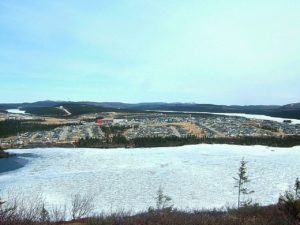On October 30, 2003, the National Assembly of Quebec voted unanimously to affirm “that the people of Québec form a nation“. On November 27, 2006, the House of Commons passed a symbolic motion moved by Prime Minister Stephen Harper declaring “that this House recognize that the Québécois form a nation within a united Canada.” However, there is considerable debate and uncertainty over what this means.
Economy:
Quebec has an advanced, market-based, and open economy.
The economy of Quebec represents 20.36% of the total GDP of Canada. Like most industrialized countries, the economy of Quebec is based mainly on the services sector. Quebec’s economy has traditionally been fueled by abundant natural resources, a well-developed infrastructure, and average productivity.

Quebec’s economy has undergone tremendous changes over the last decade. Firmly grounded in the knowledge economy, Quebec has one of the highest growth rate of gross domestic product (GDP) in Canada. The knowledge sector represents about 30.9% of Quebec’s GDP. Quebec is experiencing faster growth of its R&D spending than other Canadian provinces.
Quebec is also a major player in several leading-edge industries including aerospace, information technologies and software and multimedia. Approximately 60% of the production of the Canadian aerospace industry are from Quebec, where sales totaled C$12.4 billion in 2009. Quebec is one of North America’s leading high-tech player. This vast sector encompassing approximately 7,300 businesses and employ more than 145,000 people.
The mining industry accounted for 6.3% of Quebec’s GDP.[163] It employs about 50,000 people[164] in 158 companies.

The pulp and paper industries generate annual shipments valued at more than $14 billion. The forest products industry ranks second in exports, with shipments valued at almost $11 billion. It is also the main, and in some circumstances only, source of manufacturing activity in more than 250 municipalities in the province. The forest industry has slowed in recent years because of the softwood lumber dispute. This industry employs 68,000 people in several regions of Quebec. This industry accounted for 3.1% of Quebec’s GDP.
Agri-food industry plays an important role in the economy of Quebec. It accounts for 8% of the Quebec’s GDP and generate $19.2 billion. This industry generated 487,000 jobs in agriculture, fisheries, manufacturing of food, beverages and tobacco and food distribution.
The abundance of natural resources gives Quebec an advantageous position on the world market. Quebec stands out particularly in the mining sector, ranking among the top ten areas to do business in mining.
Quebec is remarkable for the natural resources of its vast territory. It has about 30 mines, 158 exploration companies and fifteen primary processing industries. Many metallic minerals are exploited, the principals are gold, iron, copper and zinc. Many other substances are extracted including titanium, asbestos, silver, magnesium, nickel and many other metals and industrial minerals. However, only 40% of the mineral potential of Quebec is currently known. In 2003, the value of mineral exploitation reached Quebec 3.7 billion Canadian dollars. Moreover, as a major centre of exploration for diamonds, Quebec has seen, since 2002, an increase in its mineral explorations, particularly in the Northwest as well as in the Otish Mountains and the Torngat Mountains.
Transportation:
Development and security of land transportation in Canada are provided by the ministère des Transports du Québec. Other organizations, such as the Canadian Coast Guard and Nav Canada, provide the same service for the sea and air transportation. The Commission des transports du Québec works with the freight carriers and the public transport.
